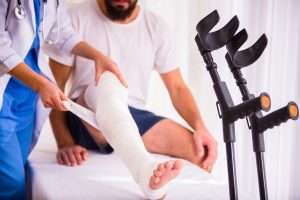IT'S MORE TO US, IT'S PERSONAL
Workers Compensation Lawyers in Huntsville AL | Alabama Injury Lawyer
Nestled in the northern part of Alabama, Huntsville's rich history of innovation and resilience mirrors the spirit of its people. From its early days as a small settlement to its pivotal role in shaping the U.S. space program, Huntsville has always been a place where challenges are met with determination and grace. Yet, amidst this backdrop of achievement and progress, personal challenges such as workplace injuries can leave even the strongest individuals feeling vulnerable and uncertain about the future.
At Wettermark Keith, we understand the emotional and physical toll that a work accident can impose on you and your family. In a city known for its breakthroughs and hard-working ethos, being sidelined by an injury can feel particularly isolating and daunting. It's not just the pain or the medical bills—it's the worry about your ability to provide for your family and the fear that your life may never return to normal.
Our team of dedicated workers' compensation lawyers in Huntsville, AL, is here to stand with you during this challenging time. Drawing from the resilience that defines our city, our attorneys are committed to fighting for your rights and ensuring that you receive the compensation and support you deserve. Let us help you navigate the complexities of your workers' compensation case, so you can focus on what's most important—your recovery and the well-being of your family.
WE CAN HELP TELL YOUR STORY.
Understanding Huntsville Workers' Compensation Benefits
Workers' compensation is a form of insurance providing wage replacement and medical benefits to employees injured on the job. It serves as a critical safety net, designed to help workers avoid the financial burdens of medical bills and lost wages. In Huntsville, AL, the law mandates employers to carry this insurance, offering protection to workers while also limiting the employer's liability.
Key Elements of Workers' Compensation:
Medical Benefits
Under workers' compensation, employees are entitled to receive full coverage for medical treatments directly related to a workplace accident that causes an injury or illness. This encompasses an array of medical care, including:
- Emergency Care: Immediate care following an accident, ensuring critical health needs are addressed.
- Hospital and Surgical Expenses: Coverage for hospital stays, surgeries, and other medical procedures deemed necessary.
- Medications and Medical Equipment: Includes prescribed drugs, prosthetics, and devices like crutches or wheelchairs.
- Rehabilitative Care: Services aimed at rehabilitation, such as physical therapy, are crucial for recovery and the restoration of function.
- Follow-up Care: Ensuring ongoing medical evaluations and treatments are accessible to support long-term recovery.
This comprehensive approach ensures that injured workers receive the medical attention needed without the burden of out-of-pocket expenses, facilitating a focus on healing and recovery.
Disability Payments
Disability benefits under workers' compensation act as a financial lifeline, compensating for wages lost due to temporary or permanent disability stemming from a work-related injury. These payments are categorized based on the nature and duration of the disability:
- Temporary Total Disability (TTD): For employees unable to work for a limited period, TTD benefits replace a portion of lost wages until they can return to work.
- Temporary Partial Disability (TPD): If an injury allows for partial work at a reduced capacity, TPD benefits help make up the difference in earnings.
- Permanent Total Disability (PTD): For accidents resulting in an inability to return to any form of employment, PTD benefits provide long-term financial support.
- Permanent Partial Disability (PPD): In cases of lasting, but not total disability, PPD benefits compensate for the worker's reduced earning capacity.
Determining the appropriate category and securing these benefits can be complex, emphasizing the importance of hiring an experienced attorney in Huntsville to protect your rights.
Rehabilitation
Rehabilitation treatment is a cornerstone of workers' compensation, offering resources necessary for injured employees to regain their strength, skills, and, if possible, return to work. This includes:
- Physical Rehabilitation: Tailored programs to restore physical function, addressing injuries through therapeutic exercises and treatments.
- Vocational Rehabilitation: For those unable to return to their previous job, vocational rehabilitation provides training for new skills, adapting to a different role or career if needed.
These services not only aid in physical recovery but also in overcoming employment barriers, ensuring a smoother transition back into the workforce or into new employment avenues.
Death Benefits
In the tragic event of a worker's death due to a workplace accident or illness, workers' compensation offers death benefits to dependents. This support includes:
- Funeral and Burial Expenses: Coverage to alleviate the financial strain of funeral arrangements.
- Financial Compensation: Provides a portion of the deceased worker's wages to their spouse, children, or other dependents, helping secure their financial future during such a difficult period.
These benefits serve as a crucial support system, offering some solace to families faced with the loss of a loved one due to a work-related incident.
Navigating the complexities of workers' compensation claims can be daunting. At Wettermark Keith, our Huntsville lawyers possess the expertise to ensure your rights are protected, guiding you toward a fair resolution.
Common Types of Work Accidents
Workplace accidents can vary widely, from minor incidents requiring short-term care to severe accidents resulting in long-term disabilities. Our Huntsville workers compensation attorneys have seen it all over the years and some of the most common accidents include:
1. Overexertion Accidents
Overexertion is a leading cause of workplace accidents, often resulting from lifting, pushing, pulling, holding, or carrying heavy objects. These actions can lead to sprains, strains, and muscle tears, particularly affecting the back, shoulders, and knees. Workers in industries requiring manual labor, such as construction, manufacturing, and warehousing, are especially prone to these types of accidents.
2. Slip, Trip, and Fall Accidents
Beyond simple falls, slips and trips can occur on wet floors, uneven surfaces, or due to cluttered workspaces, leading to injuries ranging from minor bruises to serious fractures, concussions, or even spinal damage. Huntsville employers are responsible for maintaining safe work environments to mitigate these risks.
3. Cuts and Lacerations
Cuts and lacerations, while often perceived as minor, can escalate into severe conditions depending on their depth, location, and the circumstances leading to the accident. Moreover, in environments where heavy machinery and sharp instruments are prevalent, such as in manufacturing plants, construction sites, and kitchens, there exists a heightened risk for not only cuts and lacerations but also amputations. These tragic outcomes can occur when limbs or digits are caught in or struck by machinery, leading to life-altering consequences for the affected workers.
4. Burns
A burn accident can occur in various workplaces, from kitchens with hot surfaces and cooking equipment to industrial sites handling chemicals or being exposed to extreme heat. Burns range in severity and may require extensive medical treatment, including skin grafts and rehabilitation.
5. Hearing Loss
Exposure to loud noise in the workplace, without proper ear protection, can lead to temporary or permanent hearing loss. Industries such as manufacturing, construction, and music entertainment carry high risks for auditory damage.
6. Respiratory Conditions
Respiratory conditions may develop from inhaling toxic fumes, dust, or other hazardous substances. Conditions like chronic obstructive pulmonary disease (COPD), asthma, or even cancer can arise from long-term exposure without adequate respiratory protection.
7. Eye Accidents
An eye accident can result from exposure to harmful substances, flying debris, or even prolonged screen time, leading to vision impairment or loss. Protective eyewear and regular breaks are preventive measures for such injuries.
8. Psychological
Increasingly recognized are psychological injuries, such as stress, burnout, or post-traumatic stress disorder (PTSD), stemming from high-pressure environments, bullying, or witnessing traumatic events at work. These injuries, while less visible, are equally impactful and warrant attention and care.
9. Repetitive Strain Injuries (RSIs)
Apart from the commonly known carpal tunnel syndrome, RSIs can affect various parts of the body, caused by repetitive motions or sustained awkward positions. These injuries are prevalent in Huntsville office settings, assembly lines, and professions requiring repetitive tasks.
10. Electrocutions
Electrocutions or electric shocks occur when workers come into contact with live electrical components. Such incidents can lead to burns, cardiac arrest, and other severe outcomes, particularly in construction and maintenance fields.
It's important to note that this list covers only the most common types of work-related injuries in and around Huntsville, AL. However, any injury sustained in the workplace that significantly affects an employee's health and well-being could potentially qualify for workers' compensation benefits.
If you believe your injury warrants such benefits, don’t hesitate to reach out to Wettermark Keith’s attorneys. Our experienced Huntsville attorneys are dedicated to advocating for your rights and ensuring you receive the compensation you need to support your recovery. Contact us today for a free consultation and let us guide you through the process with expertise and compassion.
 Filing A Claim for Workers Compensation in Alabama
Filing A Claim for Workers Compensation in Alabama
Filing a claim for workers' compensation is a process that requires attention to detail, adherence to legal protocols, and timely action. Whether you're dealing with a minor injury or a more serious, life-altering condition, understanding the steps involved in filing your claim is crucial.
Step 1: Report Your Injury
Immediately after sustaining a work-related injury, it's imperative to report it to your employer in writing. Alabama law mandates that you notify your employer of your injury within five days, but it is advisable to do this as soon as possible, preferably on the same day. When reporting your injury, ensure your written notification includes the following critical information:
- Your Name and Address: Clearly state your full name and home address.
- Date, Time, and Place of Injury: Specify when and where the injury occurred with as much detail as possible.
- Description of the Injury: Provide a detailed account of the injury you sustained, including how it happened and the nature of the injury itself.
- Signature: Sign the document to validate its authenticity and your acknowledgment of the reported information.
This written notice serves as an official record of your injury and is essential for the processing of your workers' compensation claim. Not only does this step formally initiate your claim, but it also helps in establishing the legitimacy of your injury, which is crucial for the subsequent steps in the compensation process. Remember, accurately and promptly reporting your injury in writing is a foundational step in protecting your rights and ensuring you receive the benefits to which you are entitled.
Step 2: Seek Medical Attention
Securing medical treatment promptly following your work-related injury is crucial for your health and well-being. It's essential, however, to navigate this step in accordance with Alabama's workers' compensation guidelines to ensure your treatment is covered under your employer's insurance plan.
For non-life-threatening injuries, you should request a list of approved physicians from your employer as soon as possible. In Alabama, employers often have pre-selected physicians authorized under their workers' compensation insurance plan to treat workplace injuries. Selecting a healthcare provider from this list is critical, as treatments and consultations from these approved physicians will be covered under the workers' compensation benefits.
It's important to communicate to the healthcare provider that your injury is work-related. This ensures that the medical documentation accurately reflects the nature of your injury, which is vital for your workers' compensation claim.
However, in the event of a life-threatening emergency, immediate medical attention is paramount. In such cases, you or your colleagues should seek the nearest emergency medical help without delay. Life-threatening conditions require prompt action, and the priority should be on obtaining the necessary medical care as quickly as possible. Once stabilized, you can then inform the healthcare provider that your injury is work-related, and follow up with your employer regarding the incident and subsequent medical treatment.
Step 3: Documentation is Key
Document everything related to your injury and the claim process. This includes keeping copies of all medical records, reports, and bills, as well as maintaining a detailed record of any communication with your employer or their insurance company. Documentation will be vital if there are any disputes regarding your claim.
Step 4: Filing the Claim
Employers are tasked with the responsibility of filing workers' compensation claims on behalf of their employees, a duty rooted in legal compliance, efficient record-keeping, and facilitating direct liaison with insurance carriers. This process is designed to expedite and streamline the claim filing, ensuring employees receive timely benefits without undue delay.
However, it's crucial for employees to actively verify that their claim has been filed, as this oversight helps prevent processing delays and protects their rights. While the employee has 5 days to notify the employer of the work injury, the employer has 15 days to submit the first report of injury to the workers compensation after an injury or illness.
Step 5: Understanding Your Benefits
Workers' compensation benefits can cover medical treatment, rehabilitation costs, and compensation for lost wages. There are different types of disability benefits depending on the severity and duration of your injury, including temporary total disability, temporary partial disability, permanent partial disability, and permanent total disability.
Step 6: If Your Claim Is Denied
If your claim is denied, you have the right to appeal the decision. The first step is usually to attempt to resolve the issue with your employer or their insurance company. If that fails, you can file a lawsuit in the state’s circuit court. This process can be complex and is best navigated with the help of an experienced workers' compensation attorney.
Mistakes to Avoid in Your Workers' Compensation Claim Process
As experienced workers' compensation lawyers, we understand that navigating this process can be stressful and intimidating. With numerous rules and procedures to follow, it's easy to make mistakes that can adversely affect the outcome of your claim. To assist you through this challenging time, we've outlined some common pitfalls to avoid during your workers' compensation claim process:
Not Reporting The Injury Immediately
A pivotal step following a workplace injury is to promptly report the incident to your employer. Under Alabama workers' compensation law, you are required to report your injury within five days of its occurrence, or within five days from when you first became aware of the issue. While some injuries, such as a broken leg or hand, are more immediately obvious, there are other injuries that could develop over time or not be found out by the worker until later, such as hearing loss or respiratory issues. Regardless, it is critical that injured workers file a report immediately with their employer.
Failing to report the injury within this timeframe can result in losing your eligibility to file for workers' compensation benefits. Immediate reporting is crucial not only to safeguard your claim but also to prevent any doubts regarding the severity of your injury. Prompt notification helps to ensure the claims process begins without delay and solidifies the connection between your injury and your employment duties.
Ensuring a Written Report of Your Injury
It is imperative that when you report your workplace injury, you do so through a written statement. Merely verbally informing your employer about your injury is insufficient and could lead to your claim being dismissed or not properly documented.
A written report provides a tangible record of the incident and ensures that all details are formally logged. This report should be comprehensive and precise, including all pertinent information such as the date, time, specific circumstances surrounding the injury, and any witnesses present. Providing a detailed and accurate written account of the incident is vital to avoid any discrepancies that could negatively impact the progression and outcome of your claim.
Not Documenting the Injury and Treatment Process
Comprehensive documentation of your injury, the circumstances surrounding it, and all medical treatments received is essential. This includes keeping detailed records of medical visits, treatments, prescriptions, and any communications with healthcare providers or your employer regarding the injury. Inadequate documentation can weaken your claim.
Failing to Obtain Medical Treatment from an Approved Provider
For non-emergency situations, receiving treatment from a physician approved by your employer or their insurance carrier is necessary for coverage under workers' compensation. Neglecting to do so can result in the denial of medical expense claims. Always verify the provider's status before receiving treatment.
Not Following Medical Advice or Treatment Plans
Ignoring or not fully complying with the treatment plan prescribed by your healthcare provider can be detrimental to your claim. Insurers may interpret this as evidence that your injury is not as severe as claimed or that you are not committed to your recovery, potentially leading to reduced benefits.
Overlooking the Importance of Legal Advice
An experienced workers' compensation attorney is crucial for navigating the process, maximizing your benefits, and ensuring your claim is accurately valued. It's essential to recognize that insurance companies may actively work to minimize your claim to reduce their financial responsibility. Settling your claim too quickly, especially under financial duress, can result in compensation that doesn't fully cover future medical expenses or lost wages. Legal experts can critically evaluate settlement offers, considering the insurer's tactics, to ensure they account for both immediate and long-term impacts of your injury, thereby preventing financial difficulties ahead.
No Recovery, No Fee - Guarantee!
Our Huntsville attorneys recognize the significant stress and financial challenges that accompany a workplace injury, not only affecting the individual but their family as well. To alleviate this burden, we’ve designed our legal services around a contingency fee arrangement. This means you won’t owe us any fees unless we successfully obtain a settlement for your case.
This innovative approach to legal representation ensures that high-quality legal support is accessible to all, regardless of financial status. We believe justice should be available to everyone, not just those who can afford to pay for it upfront.
Call Our Workers’ Compensation Lawyers Today for a Free Consultation
If you or a loved one has been injured at work, it's crucial to act swiftly to protect your rights and ensure your access to the benefits you deserve. The workers’ compensation process can be challenging, but you don’t have to do it alone. Our skilled Huntsville attorneys specialize in workers' compensation claims, offering the expertise and support needed to achieve a favorable outcome. We understand the physical, emotional, and financial toll a work-related injury can impose, and we're here to advocate on your behalf. Call Wettermark Keith’s compensation attorneys today to schedule a free consultation and start the process to secure the compensation and benefits you rightfully deserve.
Wettermark Keith™, with offices located throughout Alabama, Tennessee, and Florida, has an excellent reputation as one of the most accomplished personal injury firms in the country. Wettermark Keith’s reach is not only regional, but it also includes a diverse range of practice areas, including personal injury cases, car accidents, trucking accidents, nursing home abuse, medical malpractice, workers’ compensation cases, social security disability, and veterans’ disability claims, to name just a few. At Wettermark Keith, we believe in taking cases personally. Our purpose is to practice with care and compassion - to tell our client’s stories and make their voices heard. We do this by building strong relationships based on constant communication and an unwavering dedication to truth and trust. Winning cases isn’t our goal - caring for you is. Winning is just how we show it. As we say, It’s more to us, it’s personal.

Frequently Asked Questions
It is crucial for an injured worker to know the optimal time to call a Huntsville workers' compensation attorney as soon as possible after the injury occurs. Engaging an attorney early in the process ensures you receive professional guidance through the initial reporting of your injury, proper documentation, and adherence to state laws and filing deadlines. Early legal support can mitigate common mistakes that might weaken your claim or lead to its denial.
Moreover, legal representation from the beginning is pivotal in accurately assessing the value of your claim, negotiating effectively with insurance companies, and maximizing the benefits you deserve. Navigating the complexities of workers' compensation laws can be challenging, but you don't have to do it alone. If you've been injured at work, don't wait—contact Wettermark Keith's Huntsville office today for a free consultation. Let our experienced comp lawyers advocate for you, ensuring you receive the comprehensive compensation and care necessary for your recovery.



 Filing A Claim for Workers Compensation in Alabama
Filing A Claim for Workers Compensation in Alabama
